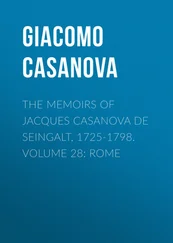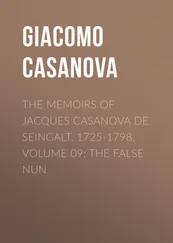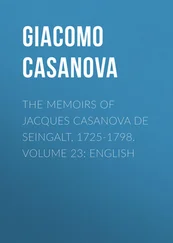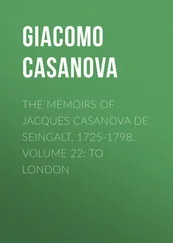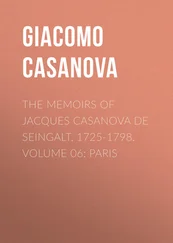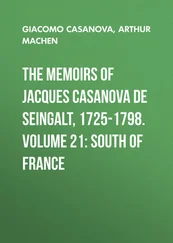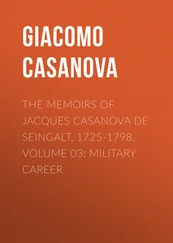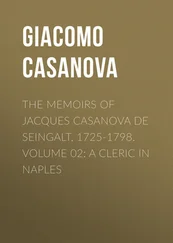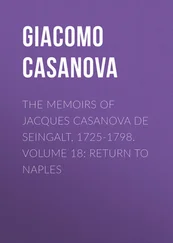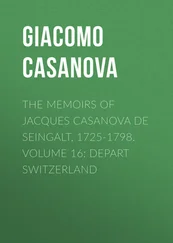Giacomo Casanova - The Memoirs of Jacques Casanova de Seingalt, 1725-1798. Volume 01 - Childhood
Здесь есть возможность читать онлайн «Giacomo Casanova - The Memoirs of Jacques Casanova de Seingalt, 1725-1798. Volume 01 - Childhood» — ознакомительный отрывок электронной книги совершенно бесплатно, а после прочтения отрывка купить полную версию. В некоторых случаях можно слушать аудио, скачать через торрент в формате fb2 и присутствует краткое содержание. Жанр: Биографии и Мемуары, История, foreign_edu, foreign_antique, foreign_prose, на английском языке. Описание произведения, (предисловие) а так же отзывы посетителей доступны на портале библиотеки ЛибКат.
- Название:The Memoirs of Jacques Casanova de Seingalt, 1725-1798. Volume 01: Childhood
- Автор:
- Жанр:
- Год:неизвестен
- ISBN:нет данных
- Рейтинг книги:3 / 5. Голосов: 1
-
Избранное:Добавить в избранное
- Отзывы:
-
Ваша оценка:
- 60
- 1
- 2
- 3
- 4
- 5
The Memoirs of Jacques Casanova de Seingalt, 1725-1798. Volume 01: Childhood: краткое содержание, описание и аннотация
Предлагаем к чтению аннотацию, описание, краткое содержание или предисловие (зависит от того, что написал сам автор книги «The Memoirs of Jacques Casanova de Seingalt, 1725-1798. Volume 01: Childhood»). Если вы не нашли необходимую информацию о книге — напишите в комментариях, мы постараемся отыскать её.
The Memoirs of Jacques Casanova de Seingalt, 1725-1798. Volume 01: Childhood — читать онлайн ознакомительный отрывок
Ниже представлен текст книги, разбитый по страницам. Система сохранения места последней прочитанной страницы, позволяет с удобством читать онлайн бесплатно книгу «The Memoirs of Jacques Casanova de Seingalt, 1725-1798. Volume 01: Childhood», без необходимости каждый раз заново искать на чём Вы остановились. Поставьте закладку, и сможете в любой момент перейти на страницу, на которой закончили чтение.
Интервал:
Закладка:
All my adventures are not to be found in these Memoirs; I have left out those which might have offended the persons who have played a sorry part therein. In spite of this reserve, my readers will perhaps often think me indiscreet, and I am sorry for it. Should I perchance become wiser before I give up the ghost, I might burn every one of these sheets, but now I have not courage enough to do it.
It may be that certain love scenes will be considered too explicit, but let no one blame me, unless it be for lack of skill, for I ought not to be scolded because, in my old age, I can find no other enjoyment but that which recollections of the past afford to me. After all, virtuous and prudish readers are at liberty to skip over any offensive pictures, and I think it my duty to give them this piece of advice; so much the worse for those who may not read my preface; it is no fault of mine if they do not, for everyone ought to know that a preface is to a book what the play-bill is to a comedy; both must be read.
My Memoirs are not written for young persons who, in order to avoid false steps and slippery roads, ought to spend their youth in blissful ignorance, but for those who, having thorough experience of life, are no longer exposed to temptation, and who, having but too often gone through the fire, are like salamanders, and can be scorched by it no more. True virtue is but a habit, and I have no hesitation in saying that the really virtuous are those persons who can practice virtue without the slightest trouble; such persons are always full of toleration, and it is to them that my Memoirs are addressed.
I have written in French, and not in Italian, because the French language is more universal than mine, and the purists, who may criticise in my style some Italian turns will be quite right, but only in case it should prevent them from understanding me clearly. The Greeks admired Theophrastus in spite of his Eresian style, and the Romans delighted in their Livy in spite of his Patavinity. Provided I amuse my readers, it seems to me that I can claim the same indulgence. After all, every Italian reads Algarotti with pleasure, although his works are full of French idioms.
There is one thing worthy of notice: of all the living languages belonging to the republic of letters, the French tongue is the only one which has been condemned by its masters never to borrow in order to become richer, whilst all other languages, although richer in words than the French, plunder from it words and constructions of sentences, whenever they find that by such robbery they add something to their own beauty. Yet those who borrow the most from the French, are the most forward in trumpeting the poverty of that language, very likely thinking that such an accusation justifies their depredations. It is said that the French language has attained the apogee of its beauty, and that the smallest foreign loan would spoil it, but I make bold to assert that this is prejudice, for, although it certainly is the most clear, the most logical of all languages, it would be great temerity to affirm that it can never go farther or higher than it has gone. We all recollect that, in the days of Lulli, there was but one opinion of his music, yet Rameau came and everything was changed. The new impulse given to the French nation may open new and unexpected horizons, and new beauties, fresh perfections, may spring up from new combinations and from new wants.
The motto I have adopted justifies my digressions, and all the commentaries, perhaps too numerous, in which I indulge upon my various exploits: 'Nequidquam sapit qui sibi non sapit'. For the same reason I have always felt a great desire to receive praise and applause from polite society:
'Excitat auditor stadium, laudataque virtus
Crescit, et immensum gloria calcar habet.
I would willingly have displayed here the proud axiom: 'Nemo laeditur nisi a se ipso', had I not feared to offend the immense number of persons who, whenever anything goes wrong with them, are wont to exclaim, "It is no fault of mine!" I cannot deprive them of that small particle of comfort, for, were it not for it, they would soon feel hatred for themselves, and self-hatred often leads to the fatal idea of self-destruction.
As for myself I always willingly acknowledge my own self as the principal cause of every good or of every evil which may befall me; therefore I have always found myself capable of being my own pupil, and ready to love my teacher.
CHAPTER I
My Family Pedigree—My Childhood
Don Jacob Casanova, the illegitimate son of Don Francisco Casanova, was a native of Saragosa, the capital of Aragon, and in the year of 1428 he carried off Dona Anna Palofax from her convent, on the day after she had taken the veil. He was secretary to King Alfonso. He ran away with her to Rome, where, after one year of imprisonment, the pope, Martin III., released Anna from her vows, and gave them the nuptial blessing at the instance of Don Juan Casanova, majordomo of the Vatican, and uncle of Don Jacob. All the children born from that marriage died in their infancy, with the exception of Don Juan, who, in 1475, married Donna Eleonora Albini, by whom he had a son, Marco Antonio.
In 1481, Don Juan, having killed an officer of the king of Naples, was compelled to leave Rome, and escaped to Como with his wife and his son; but having left that city to seek his fortune, he died while traveling with Christopher Columbus in the year 1493.
Marco Antonio became a noted poet of the school of Martial, and was secretary to Cardinal Pompeo Colonna.
The satire against Giulio de Medicis, which we find in his works, having made it necessary for him to leave Rome, he returned to Como, where he married Abondia Rezzonica. The same Giulio de Medicis, having become pope under the name of Clement VII, pardoned him and called him back to Rome with his wife. The city having been taken and ransacked by the Imperialists in 1526, Marco Antonio died there from an attack of the plague; otherwise he would have died of misery, the soldiers of Charles V. having taken all he possessed. Pierre Valerien speaks of him in his work 'de infelicitate litteratorum'.
Three months after his death, his wife gave birth to Jacques Casanova, who died in France at a great age, colonel in the army commanded by Farnese against Henri, king of Navarre, afterwards king of France. He had left in the city of Parma a son who married Theresa Conti, from whom he had Jacques, who, in the year 1681, married Anna Roli. Jacques had two sons, Jean-Baptiste and Gaetan-Joseph-Jacques. The eldest left Parma in 1712, and was never heard of; the other also went away in 1715, being only nineteen years old.
This is all I have found in my father's diary: from my mother's lips I have heard the following particulars:
Gaetan-Joseph-Jacques left his family, madly in love with an actress named Fragoletta, who performed the chambermaids. In his poverty, he determined to earn a living by making the most of his own person. At first he gave himself up to dancing, and five years afterwards became an actor, making himself conspicuous by his conduct still more than by his talent.
Whether from fickleness or from jealousy, he abandoned the Fragoletta, and joined in Venice a troop of comedians then giving performances at the Saint-Samuel Theatre. Opposite the house in which he had taken his lodging resided a shoemaker, by name Jerome Farusi, with his wife Marzia, and Zanetta, their only daughter—a perfect beauty sixteen years of age. The young actor fell in love with this girl, succeeded in gaining her affection, and in obtaining her consent to a runaway match. It was the only way to win her, for, being an actor, he never could have had Marzia's consent, still less Jerome's, as in their eyes a player was a most awful individual. The young lovers, provided with the necessary certificates and accompanied by two witnesses, presented themselves before the Patriarch of Venice, who performed over them the marriage ceremony. Marzia, Zanetta's mother, indulged in a good deal of exclamation, and the father died broken-hearted.
Читать дальшеИнтервал:
Закладка:
Похожие книги на «The Memoirs of Jacques Casanova de Seingalt, 1725-1798. Volume 01: Childhood»
Представляем Вашему вниманию похожие книги на «The Memoirs of Jacques Casanova de Seingalt, 1725-1798. Volume 01: Childhood» списком для выбора. Мы отобрали схожую по названию и смыслу литературу в надежде предоставить читателям больше вариантов отыскать новые, интересные, ещё непрочитанные произведения.
Обсуждение, отзывы о книге «The Memoirs of Jacques Casanova de Seingalt, 1725-1798. Volume 01: Childhood» и просто собственные мнения читателей. Оставьте ваши комментарии, напишите, что Вы думаете о произведении, его смысле или главных героях. Укажите что конкретно понравилось, а что нет, и почему Вы так считаете.


